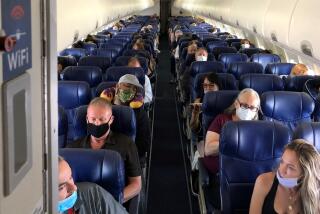No Airport Security, No Freedom to Fly
- Share via
I am an airline pilot. I work for one of the airlines whose plane flew through the World Trade Center. In fact, I’ve flown that route, that plane, many times. This should never have happened, but many pilots have been expecting something like this for a long time. We can stop this from happening again, but not by the methods introduced so far. Here are some reality-based suggestions:
Fortify the wall and door behind the cockpit; give the cockpit door an unbreakable lock; install video cameras in the cabin and a monitor in the cockpit; use sky marshals; train and arm pilots.
Pilots are your last line of defense. Arm them with home-protection-type bullets; these won’t penetrate walls or a fuselage but will definitely stop a hijacker. If even some of these protections had been in place on Sept. 11 the outcome would have been very different. With all of them, it would not have happened at all.
M.D. Moore
Newport Beach
*
There are a lot of able-bodied, patriotic men who fly frequently. They could volunteer, go through background screening and be trained to provide in-flight security on planes.
In exchange, the airlines would allow them to fly in first class (at the front of the plane, where they would protect the pilot’s area) for the cost of coach. This would be a cost-effective way to provide protection from incidents like those of Sept. 11.
Bill Serantoni
Thousand Oaks
*
Our personal freedoms may have to be curtailed for the good of the whole. Our collective safety is at stake. It is time to recognize that we need to change airport security. The private sector has proved that it is incapable of doing the job. Air safety is the responsibility of the FAA. Airport security must become the primary responsibility of a mandated, federal law-enforcement agency. A breach of conduct by an employee in the private sector might result in a slap on the hand or a simple dismissal. Law-enforcement personnel would be publicly accountable and personally dedicated to duty.
Guy Maynes
Redondo Beach
*
I think the ultimate process to identify all passengers is through fingerprints. The technology exists, it just has to be expanded. If you have your fingerprints on file, your identify can be verified in minutes. The process will not be discriminatory, as it will be a requirement for all persons who want to fly commercially.
Jack M. De Camp
Los Angeles
More to Read
Sign up for The Wild
We’ll help you find the best places to hike, bike and run, as well as the perfect silent spots for meditation and yoga.
You may occasionally receive promotional content from the Los Angeles Times.






